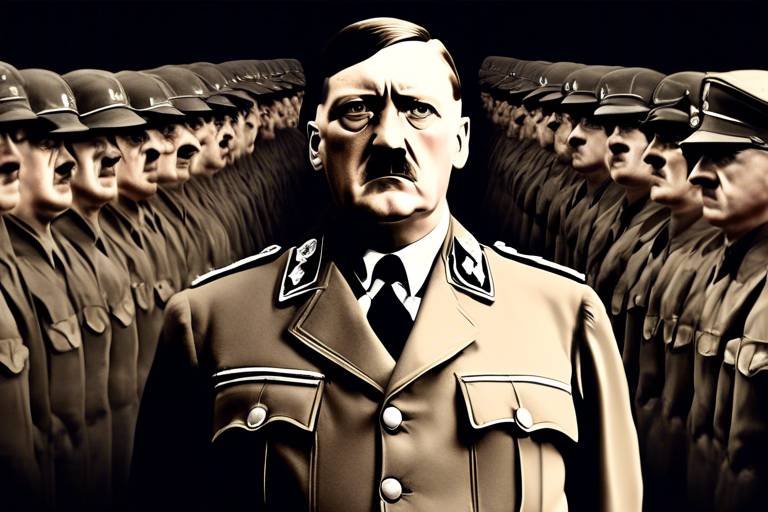The Enlightenment - Ideas that Changed the World
The Enlightenment was a transformative intellectual and philosophical movement that reshaped society in the 18th century, leaving an indelible mark on the world. It heralded the ascendancy of reason, science, individualism, and democracy, fundamentally altering the fabric of modern thought and institutions.

The Roots of Enlightenment
Exploring the intellectual and philosophical movement of the Enlightenment, which revolutionized society in the 18th century. This period saw the rise of reason, science, individualism, and democracy, shaping modern thought and institutions.
Tracing the origins of Enlightenment ideas back to the Renaissance and the Scientific Revolution, highlighting the influence of thinkers like Descartes, Newton, and Locke in shaping the intellectual landscape.
The Enlightenment was not a sudden burst of light but rather a culmination of centuries of intellectual development. It can be likened to a tree with deep roots, drawing nourishment from the rich soil of past ideas. The seeds of rational thought planted during the Renaissance and nurtured by the Scientific Revolution blossomed into the diverse branches of Enlightenment philosophy.
Descartes, with his famous phrase "I think, therefore I am," laid the groundwork for the prioritization of individual reason and skepticism. Newton's laws of motion demonstrated the power of scientific inquiry and observation in understanding the natural world. Locke's ideas on natural rights and the social contract provided a philosophical basis for challenging traditional authority and advocating for individual liberty.
Just as a tree's roots anchor it firmly in the ground, the roots of Enlightenment thinking anchored society in a new intellectual landscape, paving the way for the radical changes that would come to define the era.

The Age of Reason
The Age of Reason marked a significant shift in the way people viewed the world and their place in it. During this period, rational thinking became paramount, challenging long-held beliefs and superstitions. Thinkers of the Enlightenment encouraged skepticism of authority and promoted the idea that progress could be achieved through science and education. This era was a time of questioning, of seeking answers through reason rather than blind faith.

Philosophical Foundations
The of the Enlightenment era were rooted in a profound shift towards reason, humanism, and social contract theory. Thinkers of this time period, such as John Locke and Voltaire, emphasized the importance of empirical evidence and critical thinking in shaping knowledge and understanding. The Enlightenment rejected traditional authority and superstitions, advocating for individual rights and the pursuit of knowledge through observation and experimentation.
One of the central tenets of Enlightenment philosophy was empiricism, the belief that knowledge is derived from sensory experience and observation of the natural world. This emphasis on empirical evidence laid the groundwork for the scientific method, which revolutionized the way we investigate and understand the universe. By promoting a rational and evidence-based approach to knowledge, Enlightenment thinkers challenged the prevailing dogmas of the time and paved the way for modern scientific inquiry.
Humanism was another key principle of Enlightenment philosophy, focusing on the inherent dignity and worth of every individual. This humanistic perspective led to the promotion of equality, tolerance, and human rights, shaping the development of modern democratic societies. The Enlightenment's emphasis on the value of human reason and agency fostered a sense of empowerment among individuals, encouraging them to question authority and advocate for social and political change.
The social contract theory, as articulated by philosophers like Jean-Jacques Rousseau, proposed that the legitimacy of government is based on the consent of the governed. This idea challenged the divine right of kings and laid the foundation for modern political theory, advocating for the protection of individual rights and the establishment of representative governments. The Enlightenment's emphasis on the social contract influenced the development of democratic institutions and the concept of rule by the people for the people.

Scientific Advancements
Exploring the intellectual and philosophical movement of the Enlightenment, which revolutionized society in the 18th century. This period saw the rise of reason, science, individualism, and democracy, shaping modern thought and institutions.
Tracing the origins of Enlightenment ideas back to the Renaissance and the Scientific Revolution, highlighting the influence of thinkers like Descartes, Newton, and Locke in shaping the intellectual landscape.
Examining how the Enlightenment promoted rational thinking, skepticism of authority, and the belief in progress through science and education, challenging traditional beliefs and superstitions.
Discussing the key philosophical principles of the Enlightenment, including empiricism, humanism, and the social contract theory, which laid the groundwork for modern political and ethical thought.
Exploring the scientific breakthroughs of the Enlightenment, such as the discoveries of Copernicus and Galileo, and the development of the scientific method, which revolutionized our understanding of the natural world.
Analyzing how Enlightenment ideas influenced social structures, promoting equality, individual rights, and the separation of powers, leading to movements for liberty, democracy, and human rights.
Investigating how Enlightenment ideas spread across Europe and beyond through salons, coffeehouses, books, and pamphlets, fostering intellectual exchange and challenging traditional authorities.
Exploring the concept of enlightened despotism, where monarchs like Frederick the Great and Catherine the Great embraced certain Enlightenment ideals while maintaining absolute power, sparking debates on the nature of governance.
Reflecting on the lasting impact of the Enlightenment on modern society, from the principles of religious tolerance and freedom of speech to the foundations of democracy, science, and human rights.

Social Impact
During the Enlightenment, the social impact of new ideas and philosophies was profound, reshaping the fabric of society in significant ways. One of the key aspects of this era was the emphasis on promoting equality and individual rights. Enlightenment thinkers advocated for the idea that all individuals should have certain inalienable rights, challenging the existing social hierarchy and aristocratic privilege. This shift towards recognizing the inherent worth and dignity of every person laid the groundwork for movements advocating for liberty, democracy, and human rights.
Furthermore, the Enlightenment played a crucial role in advocating for the separation of powers within governance structures. The concept of checks and balances, popularized by thinkers like Montesquieu, aimed to prevent the concentration of power in the hands of a single individual or entity. This idea influenced the development of modern democratic systems, where power is distributed among different branches of government to ensure accountability and prevent tyranny.
Moreover, the Enlightenment fostered a spirit of intellectual curiosity and critical thinking that challenged traditional authorities and superstitions. By promoting rational inquiry and scientific reasoning, Enlightenment ideals paved the way for advancements in various fields, including medicine, technology, and governance. This emphasis on reason and evidence-based decision-making continues to shape modern society, driving progress and innovation.

The Spread of Enlightenment
The Enlightenment was not confined to a single location or group of thinkers; it spread like wildfire across Europe and beyond, igniting minds and challenging the status quo. One of the key mechanisms for the dissemination of Enlightenment ideas was the emergence of salons and coffeehouses as intellectual hubs. These vibrant spaces served as melting pots of ideas, where philosophers, scientists, writers, and artists gathered to discuss and debate the revolutionary concepts of reason, liberty, and progress. Through lively conversations and spirited debates, these gatherings fueled the intellectual fervor that characterized the Enlightenment.
Books and pamphlets also played a crucial role in spreading Enlightenment ideas to a wider audience. The printing press enabled the mass production and distribution of works by influential thinkers such as Voltaire, Rousseau, and Montesquieu. These writings challenged traditional authority, critiqued social injustices, and advocated for the rights of individuals. As these texts circulated throughout Europe, they sparked curiosity and inspired readers to question the prevailing norms and beliefs of their time.
Furthermore, the Enlightenment was not limited to the elite intellectual circles; it permeated various aspects of society, reaching individuals from different social classes and backgrounds. The accessibility of Enlightenment ideas through printed materials and public discussions helped democratize knowledge and empower ordinary citizens to engage in intellectual discourse. This democratization of knowledge was instrumental in fostering a culture of critical thinking and intellectual curiosity among the general populace.
As Enlightenment ideas continued to spread, they encountered resistance from entrenched institutions and authorities who viewed these radical notions as threats to their power. Censorship and persecution were common tactics used to suppress dissenting voices and prevent the dissemination of subversive ideas. Despite these challenges, the Enlightenment persevered, fueled by the unwavering commitment of its proponents to champion reason, tolerance, and progress.

Enlightened Despotism
Enlightened Despotism, a term coined during the Enlightenment era, refers to a style of absolute monarchy where rulers embraced certain Enlightenment ideas while maintaining their autocratic power. Monarchs such as Frederick the Great of Prussia and Catherine the Great of Russia sought to implement reforms based on reason and progress, aiming to improve the lives of their subjects. This concept sparked debates among philosophers and political theorists about the balance between centralized authority and individual freedoms.
One key aspect of Enlightened Despotism was the rulers' efforts to modernize their countries through administrative reforms, infrastructure development, and educational initiatives. For example, Frederick the Great introduced legal reforms and supported the arts and sciences, contributing to the cultural flourishing of Prussia. Similarly, Catherine the Great promoted education and cultural exchange, seeking to bring Russia closer to the intellectual currents of Western Europe.
Despite their progressive intentions, Enlightened Despots faced challenges in implementing reforms due to resistance from entrenched interests, bureaucratic obstacles, and the limitations of their absolute power. Critics argued that true enlightenment required the participation and consent of the governed, questioning the legitimacy of top-down reforms imposed by rulers, even if well-intentioned.
Enlightened Despotism raised fundamental questions about the nature of governance, the role of rulers in promoting the welfare of their subjects, and the balance between authority and liberty. It exemplified the complex interplay between enlightened ideas and political realities, highlighting the tensions between reform and tradition, innovation and stability.

Legacy of the Enlightenment
The continues to shape our modern world in profound ways. The intellectual and philosophical movement of the Enlightenment laid the foundation for many of the principles and values that we hold dear today. From religious tolerance to freedom of speech, the Enlightenment championed ideas that have become fundamental to our society.
One of the most significant legacies of the Enlightenment is the emphasis on individual rights and freedoms. The belief in the inherent dignity and worth of every individual, regardless of social status or background, has had a lasting impact on our understanding of human rights. This principle has been enshrined in modern legal systems and international declarations, shaping the way we think about equality and justice.
Furthermore, the Enlightenment's promotion of scientific inquiry and rational thinking has revolutionized our understanding of the natural world. The scientific method, developed during this period, continues to be the foundation of modern scientific research and discovery. The emphasis on reason and evidence-based knowledge has led to incredible advancements in fields such as medicine, technology, and environmental science.
Additionally, the Enlightenment's advocacy for democracy and political participation has had a lasting impact on the structure of modern governments. The idea of popular sovereignty, the belief that political power ultimately resides with the people, has shaped the development of democratic institutions around the world. The principles of separation of powers and checks and balances that emerged during this period continue to be essential components of democratic governance.
Moreover, the Enlightenment's legacy can be seen in the ongoing struggles for social justice and human rights globally. The Enlightenment thinkers' emphasis on equality and liberty has inspired movements for civil rights, gender equality, and the protection of marginalized communities. The principles of tolerance and inclusivity that emerged during this period continue to guide our efforts to create a more just and equitable society.
Frequently Asked Questions
- What was the Enlightenment?
The Enlightenment was an intellectual and philosophical movement that took place in the 18th century. It emphasized reason, science, individualism, and democracy, challenging traditional beliefs and shaping modern thought and institutions.
- Who were some key figures of the Enlightenment?
Key figures of the Enlightenment included thinkers like Descartes, Newton, Locke, Voltaire, Rousseau, and Montesquieu. Their ideas and writings played a significant role in promoting rational thinking and social reform.
- What were the main principles of the Enlightenment?
The Enlightenment was characterized by principles such as empiricism, humanism, skepticism of authority, and the belief in progress through science and education. These ideals laid the foundation for modern political and ethical thought.
- How did Enlightenment ideas spread?
Enlightenment ideas spread through salons, coffeehouses, books, and pamphlets across Europe and beyond. Intellectual exchange and debates in these spaces helped challenge traditional authorities and promote new ways of thinking.
- What was the legacy of the Enlightenment?
The Enlightenment left a lasting impact on modern society, influencing principles of religious tolerance, freedom of speech, democracy, science, and human rights. Its ideas continue to shape our understanding of governance and individual rights.



















